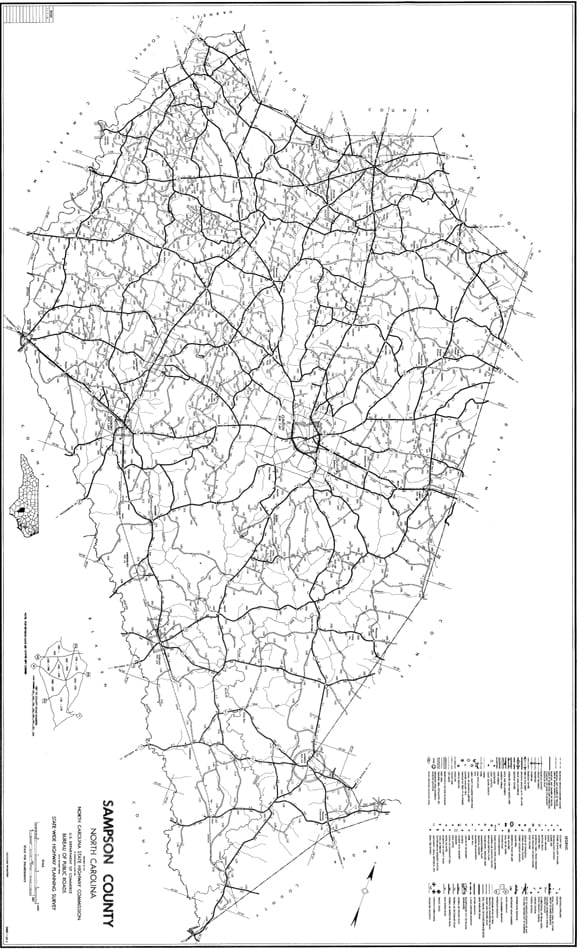Sampson County is the second-largest county in the U.S. state of North Carolina by area. As of the 2010 Census, the population was 63,431. Its county seat is Clinton.
Sampson County is made up of eight municipalities: Autryville, Clinton, Garland, Harrells, Newton Grove, Roseboro, Salemburg, and Turkey.
Autryville: Autryville is located on the banks of the South River, about 15 miles southeast of Fayetteville on Highway 24, in an area designated as the Autrys depot by President Gray of the Cape Fear and Yadkin Valley Railroad in April 1889. Named for Captain James L. Autry, who was instrumental in the railroad’s location, the town was incorporated in 1891. Autryville was home to historical figure Micajah Autry, a Sampson County resident who fought alongside Davy Crockett at the Alamo. The town is governed by a mayor and five-member commission.
Clinton: The City of Clinton is the oldest and largest municipality in Sampson County and the county seat. Incorporated in 182, the city is named for American Revolutionary General Richard Clinton, stepson to the County’s namesake John Sampson. Named an All-America City in 2007, Clinton operates under a council-manager form of government with a mayor, five member council and appointed city manager.
Garland: Like many of Sampson County’s towns, Garland was established largely due to the railroad. In 1886, locals petitioned the Cape Fear and Yadkin Valley Railroad to include a depot near the town’s present site. Incorporated in 1907, the small town was named for the assistant postmaster general of the United States at that time, Henry Garland. William Cromartie took possession of land grants from the King of England for his service in the English navy and located in the southern Sampson County area now known as Garland. Historical figure, Dr. Amos Johnson, is credited with establishing one of the nation’s first physician assistant programs at his rural Garland clinic.
Harrells: The town of Harrells straddles both Sampson and Duplin counties. Incorporated in 1943 as Harrells Store, the town changed its name to Harrells in 1952. The southernmost town incorporated town in Sampson County, Harrells is home to Harrells Christian Academy, a large private school. The community is widely regarded for its agriculture and prime hunting areas.
Newton Grove: Located in the northern end of Sampson County, the Town of Newton Grove is 40 miles southeast of Raleigh, 30 miles east of Fayetteville and 25 miles west of Goldsboro. Intersecting in the town circle are the major roadways of US 13, NC 701, NC 50 and NC 55. First named Williams, then the New Town at the Grove (because of a prominent oak grove in the area), the Town of Newton Grove was incorporated in 1879, and then again in 1935.
Roseboro: The Town of Roseboro sprang to life with the establishment of a depot on Cape Fear and Yakin Valley Railroad line from Fayetteville to Wilmington. The second largest town in Sampson County, Roseboro was incorporated in 1891 and is named for John M. Rose, the secretary of the Cape Fear and Yadkin Valley Railroad. Since its inception the tiny crossroads with one store has grown to a community of more than 1,400. The town was home to the county’s first drug store, Tart & West Druggist, which operated for almost 100 years; the county’s first automobile agency, Underwood Motor Company; and the first bank in Sampson County, the Bank of Roseboro.
Salemburg: According to Oscar Bizzell’s The Heritage of Sampson County, North Carolina, the history of Salemburg is primarily the history of its schools and colleges. The name of the town comes from the old Salem Baptist Church, and the “burg” was added to differentiate the small town from the other Salem in Forsyth County. The town has been home to Pineland College and Edwards Military Institute, both of which became Southwood College. It is currently home to the North Carolina Justice Academy and the Tarheel Challenge Academy. Incorporated in 1905, Salemburg was named the first Model Community in 1914 by the Rockefeller Foundation.
Turkey: Located on the east side of Sampson County near its adjacent border with Duplin County at Interstate 40, is the small community of Turkey. Settled in the 1700’s by families from Scotland and originally known as Springville, the town was named for Turkey Creek, reportedly because of the large number of wild turkeys in the region in colonial times. Incorporated in 1913, Turkey is the home of several farm related industries. It is governed by a mayor-commissioner form of government. Turkey was the birthplace of the county’s noted historian, Claude Hunter Moore.
